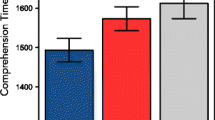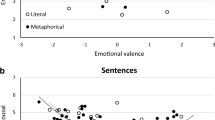Abstract
This study examines the effects of categorical and affective similarities between the constituent words of sentence (Noun-A is like Noun-B) on metaphor appreciation. In the preliminary studies using 48 words to be used later, the two kinds of similarity were measured separately by either sorting or semantic differential technique. In the main study, a set of five rating tasks concerning three types of formulaic sentences (literal, metaphorical, and anomalous) was given for each of 28 subjects in relation to (a) similarity between the words in a pairing, (b) similarity of the words in a particular formulaic sentence, (c) sentence comprehensibility, (d) sentence novelty, and (e) metaphor aptness. The application of path analysis for the above data revealed the following: (1) Categorical dissimilarity affects novelty [N], (2) affective similarity influences comprehensibility [C], and (3) [N] and [C] affect metaphor aptness.
Access this article
We’re sorry, something doesn't seem to be working properly.
Please try refreshing the page. If that doesn't work, please contact support so we can address the problem.
Similar content being viewed by others
References
James L.R., Mulaik, S.A., & Brett, J.M. (1982).Causal analysis: Assumptions, models and data. Beverly Hills: Sage.
Katz, A.N., Paivio, A., & Marschark, M. (1985). Poetic comparisons: Psychological dimensions of metaphoric processing.Journal of Psycholinguistic Research, 14, 365–383.
Kusumi, T. (1985). Similarity between constituent words or phrases of metaphors: Effect of feature salience in comprehending metaphor.Japanese Journal of Psychology, 56, 269–276. (In Japanese with English summary)
Malgady, R.G. (1977). Discriminant analysis of psychological judgments of literal and figurative meaningfulness versus anomaly.Journal of Psychology, 95, 217–221.
Malgady, R.G., & Johnson, M.G. (1976). Modifiers in metaphors: Effects of constituent phrase similarity on the interpretation of figurative sentences.Journal of Psycholinguistic Research, 5, 43–52.
Marschark, M., Katz, A.N., & Paivio, A. (1983). Dimensions of metaphor.Journal of Psycholinguistic Research, 12, 17–40.
Miller, G.A. (1969). A psychological method to investigate verbal concepts.Journal of Mathematical Psychology, 6, 169–191.
Nakamura, A. (1977).Hiyu hyougen jiten [Japanese dictionary of metaphorical expression]. Tokyo: Kadokawa Shoten.
Nida, E.A. (1975).Component analysis of meaning: An introduction to semantic structure. The Hague: Mouton.
Ortony, A. (1979a). The role of similarity in similes and metaphors. In A. Ortony (Ed.),Metaphor and thought. Cambridge, England: Cambridge University Press.
Ortony, A. (1979b). Beyond literal similarity.Psychological Review, 86, 161–180.
Osgood, C. (1962). Studies on the generality of affective meaning systems.American Psychologist, 17, 10–28.
Paivio, A. (1979). Psychological processes in the comprehension of metaphor. In A. Ortony (Ed.),Metaphor and thought. Cambridge, England: Cambridge University Press.
Takane, Y. (1980).Tajigenshakudohou [Multidimensional scaling]. Tokyo: University of Tokyo Press.
Tourangeau, R., & Sternberg, R.J. (1981). Aptness in metaphor.Cognitive Psychology, 13, 27–55.
Tourangeau, R., & Sternberg, R.J. (1982). Understanding and appreciating metaphors.Cognition, 11, 203–244.
Tversky, A. (1977). Features of similarity.Psychological Review, 84, 327–352.
Author information
Authors and Affiliations
Additional information
A portion of the results was reported at the First Annual Conference of the Japanese Cognitive Science Society, Kyoto, July 1984.
Rights and permissions
About this article
Cite this article
Kusumi, T. Effects of categorical dissimilarity and affective similarity between constituent words on metaphor appreciation. J Psycholinguist Res 16, 577–595 (1987). https://doi.org/10.1007/BF01067086
Accepted:
Issue Date:
DOI: https://doi.org/10.1007/BF01067086




